
Allergies are a spontaneous reaction that occurs when our body’s immune system rejects any foreign substance. Like humans, pets also suffer from allergies. There are different types of allergies that dogs suffer from which may include allergy from human food, dog food, environment or seasonal allergies. We have sorted out 6 common types of dog allergies, which will help you to know more about their symptoms and how they can be treated.
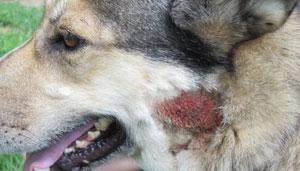
Dogs mostly suffer from allergens like pollen, dust and mold that are seasonal in most cases and the dog itches only during specific times of the year. These skin allergies may likely to cause other secondary infections. If your dog is highly susceptible to seasonal allergies, try to keep him free from the environmental allergens as much as possible. Keep the floors and his bedding clean by vacuuming it regularly. Ensure that his diet is low in grain content as high carbohydrates can also worsen inflammation. Contact your vet for treatments regarding seasonal allergies that suits best to your dog.

Dog owners often mistake allergy itchiness for dry skin in winters and flea during summers. If your dog suffers an upset stomach and digestion issues after he has eaten any human food, then allergic reaction can be the cause. The best way to avoid this is to only rely on high-quality dog food as human food may contain several ingredients that may not suit him. During a human food allergy, symptoms can include itching, vomiting, hives and diarrhoea. Treatment of the allergy will depend upon the severity of its reaction. If the allergy worsens and your dog starts having breathing problem, rush to your veterinary doctor right away.
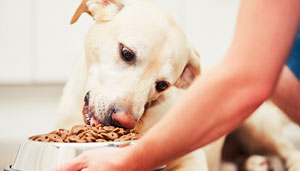
Dog food allergy is not a true food allergy but it means that the dog has a food sensitivity or food intolerance. The gradual reaction can be to any dog food’s ingredient like eggs, beef, corns, milk or soy. Symptoms during a dog food allergy can include poor skin, itchiness, chronic ear or foot infections or gastrointestinal signs like diarrhoea or vomiting. The best way to treat dog food allergy is to work together with your veterinarian to find out the ingredient causing food reaction and manage the dog’s symptoms.
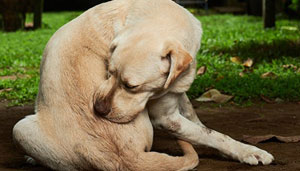
The dog’s immune system is often prone to airborne allergens. Different types of allergens can cause atopy in dogs which is similar to asthma in humans. Affected dogs get allergic to dust, pollens or other airborne particles and scratch all over, chew or lick their body. Itching may also persist around eyes and ears or inside the thighs. Frequent bathing with hypoallergenic shampoos can give temporary relief to the dogs. Antibiotics along with certain omega fatty acids may also be required to treat the infection.
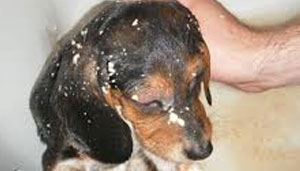
Environmental allergies occur when dogs’ immune system is sensitive to a certain substance like grass, mites or pollens. These can cause an itchy skin or other skin related problems in dogs. The allergy can be managed with a combination of dietary changes, medicines and medical washes. Affected dogs can now also be given a special sensitisation vaccination for the allergens that affect them. Your dog can lead a healthy and symptom free life by limiting their exposure to the allergens, giving them possible medications and a specialised diet.
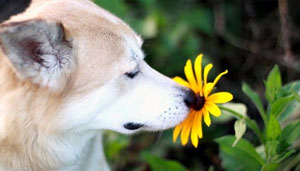
Dogs are not only prone to environmental allergies but there are also certain things around home like carpet fibres or moulds that can make them allergic. The affected dog develops a red itchy skin and ear infections. These reactions are generally seasonal but can be long term also. The best way to treat it is to see a vet when the first symptom develops so that it can be controlled well on time.